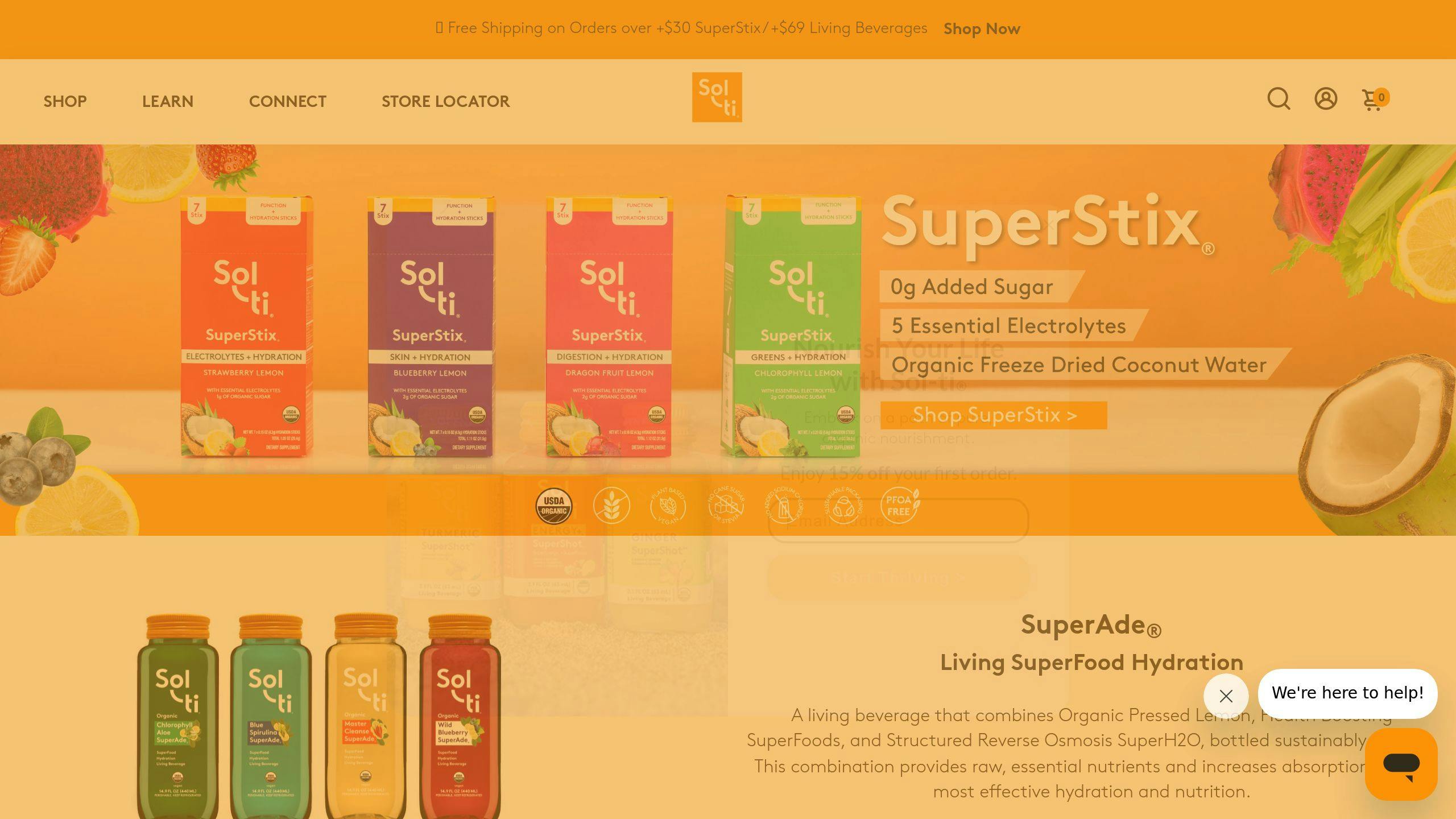Prebiotics are plant-based fibers that feed good gut bacteria, helping with digestion and reducing bloating. Unlike probiotics, they nourish bacteria already in your gut. Anti-bloating drinks with prebiotics like inulin, FOS, and GOS provide an easy, natural way to improve gut health. Research shows consistent use can reduce bloating and gas over time. Look for drinks with 3-5g of prebiotic fiber per serving, minimal added sugars, and complementary ingredients like ginger for added benefits. Start slow to let your body adjust, and enjoy better digestion with regular use.
Replacing Water with Prebiotic Sodas – A Doctor's Analysis
Prebiotics and Bloating: The Science
Prebiotics and Gut Health
Prebiotics play a key role in supporting digestive health and easing bloating. Once these fibers reach the colon, they undergo fermentation, which selectively feeds beneficial bacteria like Bifidobacteria and Lactobacilli [3]. This process produces short-chain fatty acids (SCFAs) that strengthen the intestinal barrier. By doing so, they help maintain a balanced gut environment, making it less hospitable for gas-producing harmful bacteria [4].
Studies on Prebiotics and Bloating
A 2016 study in Alimentary Pharmacology & Therapeutics reported that oligofructose supplements reduced bloating symptoms in IBS patients after just four weeks of use [6].
"This research shows, regular consumption of prebiotics could actually help to regulate intestinal gas metabolism. This could go a long way in helping with reducing bloating and excess gas in many people." - OptiBac Probiotics [5]
Interestingly, research highlights that gas levels in the gut initially rise by 37% when prebiotics are first introduced. However, this effect normalizes after two weeks of consistent consumption [5], reinforcing the importance of regular use.
Different types of prebiotic fibers have varying impacts on bloating, as shown in clinical trials:
| Prebiotic Type | Benefits for Bloating |
|---|---|
| Fructo-oligosaccharides (FOS) | Helps reduce bloating, especially in IBS patients |
| Galacto-oligosaccharides (GOS) | Improves bloating scores |
| Resistant Starch | Aids digestion, reducing bloating |
| Inulin | May require careful dosing for sensitive people |
Prebiotic Ingredients in Anti-Bloating Drinks
Types of Prebiotic Fibers
Anti-bloating drinks often include specific prebiotic fibers chosen for their digestive benefits. One common ingredient is inulin, sourced from chicory root. It resists digestion in the upper gastrointestinal tract, reaching the colon intact, where it supports the growth of beneficial Bifidobacteria [1][3].
Other fibers like FOS (Fructooligosaccharides) and GOS (Galactooligosaccharides) also play a role. FOS ferments more quickly, offering faster relief, while GOS is more suitable for people with lactose sensitivity [2]. These fibers align with clinical findings showing noticeable reductions in bloating when used consistently.
| Prebiotic Type | Source | Typical Amount per Serving |
|---|---|---|
| Inulin | Chicory Root | 2-3g |
| FOS | Synthesized or Natural | 1-2g |
| GOS | Lactose-derived | 1.5-2.5g |
| Resistant Starch | Green banana, potato | 2-4g |
Daily Prebiotic Intake Recommendations
Health experts suggest consuming 5-8g of prebiotics daily. However, anti-bloating drinks typically offer 3-5g per serving to help your body adjust gradually [2][3]. Research has shown that just 5 grams of inulin per day over eight weeks can lead to a 56% reduction in constipation symptoms [7].
For the best results, look for drinks that specify the type of fiber used (3-5g per serving), limit added sugars, and include complementary ingredients like ginger. Some brands even combine prebiotics with herbs like ginger to enhance their bloating-relief effects.
sbb-itb-74fe2fe
Selecting an Anti-Bloating Drink
What to Look for in Prebiotic Drinks
When choosing an anti-bloating drink, focus on a few key factors to ensure it's effective. Look for drinks with proven prebiotic ingredients in amounts that matter. Ideally, the label should list 3-5 grams of prebiotic fiber per serving. Common types to watch for include inulin, FOS, or GOS, which should be clearly mentioned.
Ingredient quality is another important consideration. Go for options made with organic and non-GMO ingredients to avoid unnecessary additives. Pay close attention to the sweeteners used - natural choices like stevia or monk fruit are better for gut health compared to artificial alternatives, which can disrupt your microbiome [8].
| Feature | Ideal Choice |
|---|---|
| Prebiotic Fiber | 3-5g per serving |
| Ingredient Standards | Organic, non-GMO |
| Sweeteners | Natural (e.g., stevia, monk fruit) |
| Added Benefits | Ingredients like ginger or mint |
| Labeling | Clear details on fiber type and amount |
Adjusting to Prebiotics: What to Expect
When starting prebiotic drinks, your gut might need some time to adjust. Temporary gas or bloating can occur as your microbiome adapts [5]. To minimize discomfort, begin with half servings and consume the drink between meals. These effects usually settle as your body gets used to the fermentation process. If the discomfort persists, try spreading out your servings throughout the day.
How Prebiotic Drinks Compare to Other Sources
Prebiotic drinks offer a level of convenience and precision that whole foods can't always match. They provide measured doses of prebiotics, making it easier to maintain consistent intake. While foods like chicory root and Jerusalem artichokes are excellent natural sources, drinks often combine multiple beneficial ingredients and are easier to incorporate into a busy routine. That said, they should be an addition to - not a replacement for - a diet that includes a variety of prebiotic-rich foods.
Sol-ti and Prebiotics in Their Products

Sol-ti's Commitment to Health and Sustainability
Sol-ti follows a science-driven approach, blending prebiotic benefits with eco-friendly practices. Instead of relying on traditional heat pasteurization, they use UV light filtration, which keeps more nutrients intact while consuming 95% less energy. This method aligns perfectly with prebiotics, which naturally support gut health through fermentation.
Their beverages are packaged exclusively in glass bottles, ensuring prebiotic stability and supporting their zero-waste mission. True to their name, Sol-ti operates from a solar-powered facility, emphasizing their dedication to sustainability.
"We create drinks that support health as much as they delight taste", says Founder Ryne O'Donnell.
Prebiotics in Sol-ti Products
Sol-ti incorporates prebiotics from natural, organic sources, staying consistent with the research-backed benefits of ingredients like chicory root. Their product lines feature a variety of prebiotic sources:
| Product Line | Prebiotic Sources |
|---|---|
| SuperAde® | Lemon-derived fibers |
| SuperShot® | Concentrated plant fibers |
| SuperStix® | Mineral-activated fibers, delivering 3g per stick |
The UV Light Filtered™ process preserves the natural properties of these prebiotics, ensuring their effectiveness. By combining careful processing with organic, farm-to-bottle ingredients, Sol-ti delivers beverages that promote gut health while upholding their commitment to sustainable agriculture and eco-friendly practices.
Conclusion
Key Takeaways on Prebiotics
Clinical studies and product innovations highlight how prebiotics can help ease digestive issues. These plant-based fibers feed healthy gut bacteria, creating a better environment for digestion. Plus, prebiotic drinks often have less added sugar than regular beverages - but it's still important to enjoy them in moderation.
Tips for Getting Started
Here are some tips for making the most of prebiotic anti-bloating drinks:
- Begin with smaller servings to help your body adjust.
- Aim for 5g of fiber daily from a mix of drinks and whole foods.
- Look for organic products with clear fiber details on the label.
Pay attention to how your body reacts and tweak your intake as needed. Research suggests that regular use can improve how your body handles gas over time.
When choosing a drink, go for options with clear ingredient lists and eco-friendly packaging. For example, brands like Sol-ti combine effective prebiotics with sustainable practices, using UV-filtered processing and glass containers.


